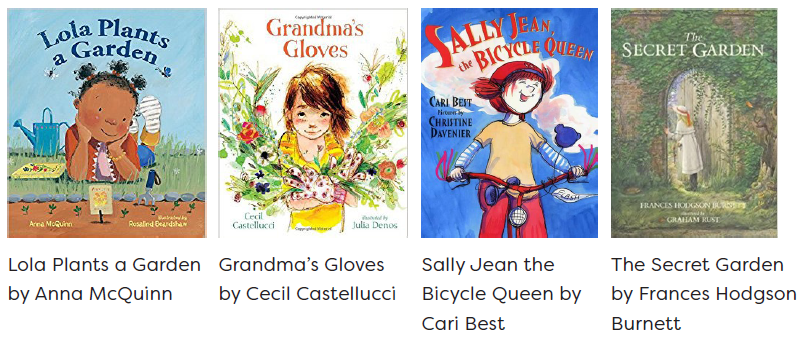4 Books To Read With Your Child This Spring

Spring is in the air, even if the weather needs a little more encouragement. Help your child welcome the season by enjoying these 4 spring themed stories.
Lola Plants a Garden by Anna McQuinn
Younger readers may already be familiar with the Lola series. In this 4th book, Lola decides to plant some flowers after being inspired by poems about gardening. This simple story will be best enjoyed by preschoolers and kindergartners, but slightly older readers will also find amusement in Lola’s gardening adventure.
The Secret Garden by Frances Hodgson Burnett
This classic is a must read for any spring reader. After the loss of her parents sends Mary Lennox into the home of her uncle, she begins to discover the many secrets found on the Yorkshire moors. Of those secrets, a magical garden that has been hidden for years becomes a focus for Mary and she discovers the mysteries it holds. This enchanting tale is a great reminder of how nature can breath new life into a world of sorrow.
Sally Jean the Bicycle Queen by Cari Best
Who doesn’t love to ride their bike in the springtime? Sally Jean certainly does. The bicycle queen rides all day, every day…until the she outgrows her bike! Kids will be inspired by Sally Jean’s resourcefulness as she sets out to build herself a new bike with what she has available. This is the perfect story to teach kids how to adapt to changes and never give up on what they love.
Grandma’s Gloves by Cecil Castellucci
This is a sweet book to help children understand how our loved one’s live on even after we lose them. In Grandma’s Gloves, a little girl spends spring and summer days helping her grandmother tend to the garden while becoming watered herself through her grandmother’s love and care. After she loses her grandma, the young girl realizes the she is not alone as long as she remembers what her grandmother taught her and continues to grow into the most special flower of all.
Does Your Child Have Goals?
Though we may put more emphasis on goal setting for middle and high schoolers, the earlier children get into the habit of setting goals the better. Younger children who set goals have the chance to develop patience and a strong work ethic. When kids learn the amount of effort and work it takes to obtain the things they want, they are also more likely to express appreciation for the things they have, as well as the hard work you put into providing for them.
Teach SMART Goals
A lack of experience and knowledge may lead to your child setting lofty goals that may not be realistic or reasonable. This can can bring disappointment or frustration to young children and may even deter them from creating goals for themselves. To prevent this, make sure that you are giving them the proper guide to setting goals. Each goal your child sets should be a SMART goal.
SMART goals are:
Specific: Clearly identify the what, how, and when of a goal.
Measurable: Make sure your child can keep track of the progress of their goal and its timeline.
Achievable: Is your child able to achieve their goal in the timeframe set?
Relevant: Is this goal something that truly matters to your child?
Time-Bound: Your child’s goals should have a definite end date.
Make it a Family Activity
The best way to get your child in the habit of setting goals is to lead by example. Share some of your goals with them and what you plan on doing to achieve them. Set goals they you would like to achieve as a family. As you make goals and reach them, the whole family will benefit from your successes.
Develop Reading Comprehension Skills at Home
A student’s ability to understand what they read is just as important if not more so as how much they read. While reading comprehension is developed here in school, encouraging this skill at home is necessary for it to take hold.
As you take time with your child to read at home, consider a few ways you can help their reading comprehension skills grow.
Don’t Read for Speed
After a long day at school and work, you and your child may be tempted to race through a story just to get it out of the way. However, this can be a bad habit for a student to start. Speed reading or skimming through a book often results in little comprehension of the subject. In fact, this can cost a child more time if they have to go back and look for answers or reread passages in order to grasp a point.
Always encourage your child to read at a steady pace, whether for pleasure or study purposes. If your child is reading for a school assignment, be sure to have them stop periodically to ensure they understood what they read before moving on.
Ask Questions
Even as adults we periodically may let our minds drift while reading, so we shouldn’t expect anything less of our children. Help your child keep their focus by asking them questions periodically throughout the story. Make sure they understand what’s happening and are paying attention to any important themes.
Look up Words
Vocabulary and reading comprehension go hand in hand. Get into the habit of helping your child understand the meaning of words based on how it is used in the passage. If they are still unsure of the word’s meaning, have them look it up.
Find Books Based on Interests
Finding books your child wants to read will ensure they actually read it and make it easier for them to grasp any messages or information contained in the book. Before selecting books for your child, pay attention to what their interests are and ask them what topics they would like to read about. Take a trip to your local library and ask the librarian for assistance in finding books related to these interests.
Conversation Starters To Try
Kids have a lot to say, but sometimes we just need to ask the right questions. Try these 4 conversation starters at your next meal to unlock some of the gems you may be missing out on.
“What would you like to do/what do you want to be when you grow up?”
One of the reasons this works well for elementary age students is because there are many things they want to be when they grow up. Asking this question is a great way to learn the things your child is interested in and allows for more questions such as “Why do you want to do that?” or “How do you think you can accomplish that?” It is a great way to help your child start thinking about their future in real terms.
“What are your favorite spring memories?”
Spring is fast approaching and instead of asking what your child wants to do as the weather gets nicer, asking this question may shed some light on the activities they enjoy. This will also give you a chance to reflect on activities you can do as a family.
“What do you want to accomplish before the end of the school year?”
As the weather gets nicer and summer begins to approach, it may be difficult for your child to focus. Asking this question will remind them that school is still underway and they have the responsibility to pursue academic success. Additionally, you can discuss ways that you can help them accomplish these goals.
“Who do you appreciate most at your school and why?”
Expressing appreciation doesn’t always come easy to kids. Asking them to think about who they appreciate at Summit Academy forces them to express appreciation for acts of kindness or efforts that may normally go unnoticed. You can also use this question as a way to help them brainstorm ways they can show their gratitude to those they appreciate.
Summit is Better: Empowerment

At Summit Academy, empowerment isn’t just a buzzword; it’s a promise. As the school of choice, empowering all members of our family is the only way we can help our students secure a promising future.
No Limits on Potential
Individualized learning gives students the power to get the most out of their education. Instead of setting the bar for them, our students are not limited by cookie cutter curriculum or a one size fits all approach to learning. As a student of Summit Academy, your child is able to choose the best path for them to achieve their goals. When combined with our advanced resources and dedicated staff, students are empowered to be their best self.
The Freedom to Teach
The best teachers are the ones who are able to personalize their teaching methods and connect with their students. Our teachers are empowered by their freedom to create curriculum based on their unique styles of teaching and the needs of their students. Though they are guided by school requirements, our teachers have the ability to focus more on the “what” of teaching without being told “how” to do it. Teacher empowerment is what paves the way for new classes and activities to be offered to our students. Ultimately, empowered teachers are what helps our schools to continually grow and improve.
Power to the Parents
Empowering you with the ability to be directly involved in your child’s education is extremely important to our staff. We not only want you to be aware of what goes on at our schools, we want you to be apart of your child’s experience and participate as much as you are able. Your participation is what encourages your child to be successful and it allows you to work with our teachers as we all work towards the same goal: preparing your child for a rewarding college career.
